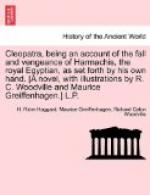And she stretched out her hand for me to kiss, looking on me with strange eyes, as though she struggled with herself. Then I went; but that night I strove once more to see Cleopatra, and could not. “The Lady Charmion was with the Queen,” so said the eunuchs, and none might enter.
On the morrow the Court met in the great hall one hour before mid-day, and I went thither with a trembling heart to hear Cleopatra’s answer to Dellius, and to hear myself also named King-consort to the Queen of Egypt. It was a full and splendid Court; there were councillors, lords, captains, eunuchs, and waiting-women, all save Charmion. The house passed, but Cleopatra and Charmion came not. At length Charmion entered gently by a side entrance, and took her place among the waiting-ladies about the throne. Even as she did so she cast a glance at me, and there was triumph in her eyes, though I knew not over what she triumphed. I little guessed that she had but now brought about my ruin and sealed the fate of Egypt.
Then presently the trumpets blared, and, clad in her robes of state, the uraeus crown upon her head, and on her breast, flashing like a star, that great emerald scarabaeus which she had dragged from dead Pharaoh’s heart, Cleopatra swept in splendour to her throne, followed by a glittering guard of Northmen. Her lovely face was dark, dark were her slumbrous eyes, and none might read their message, though all that Court searched them for a sign of what should come. She seated herself slowly as one who may not be moved, and spoke to the chief of the heralds in the Greek tongue:
“Does the Ambassador of the noble Antony wait?”
The herald bowed low and made assent.
“Let him come in and hear our answer.”
The doors were flung wide, and, followed by his train of knights, Dellius, clad in his golden armour and his purple mantle, walked with cat-like step up the great hall, and made obeisance before the throne.
“Most royal and beauteous Egypt,” he said, in his soft voice, “as thou hast graciously been pleased to bid me, thy servant, I am here to take thy answer to the letter of the noble Antony the Triumvir, whom to-morrow I sail to meet at Tarsus, in Cilicia. And I will say this, royal Egypt, craving pardon the while for the boldness of my speech—bethink thee well before words that cannot be unspoken fall from those sweet lips. Defy Antony, and Antony will wreck thee. But, like thy mother Aphrodite, rise glorious on his sight from the bosom of the Cyprian wave, and for wreck he will give thee all that can be dear to woman’s royalty—Empire, and pomp of place, cities and the sway of men, fame and wealth, and the Diadem of rule made sure. For mark: Antony holds this Eastern World in the hollow of his warlike hand; at his will kings are, and at his frown they cease to be.”
And he bowed his head and, folding his hands meekly on his breast, awaited answer.




